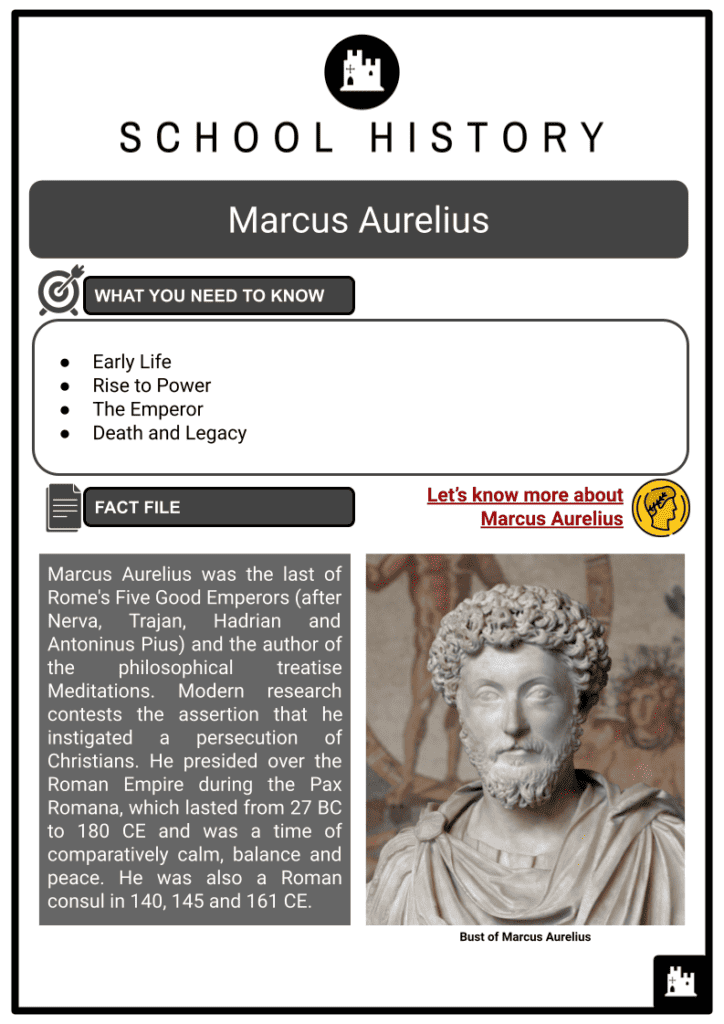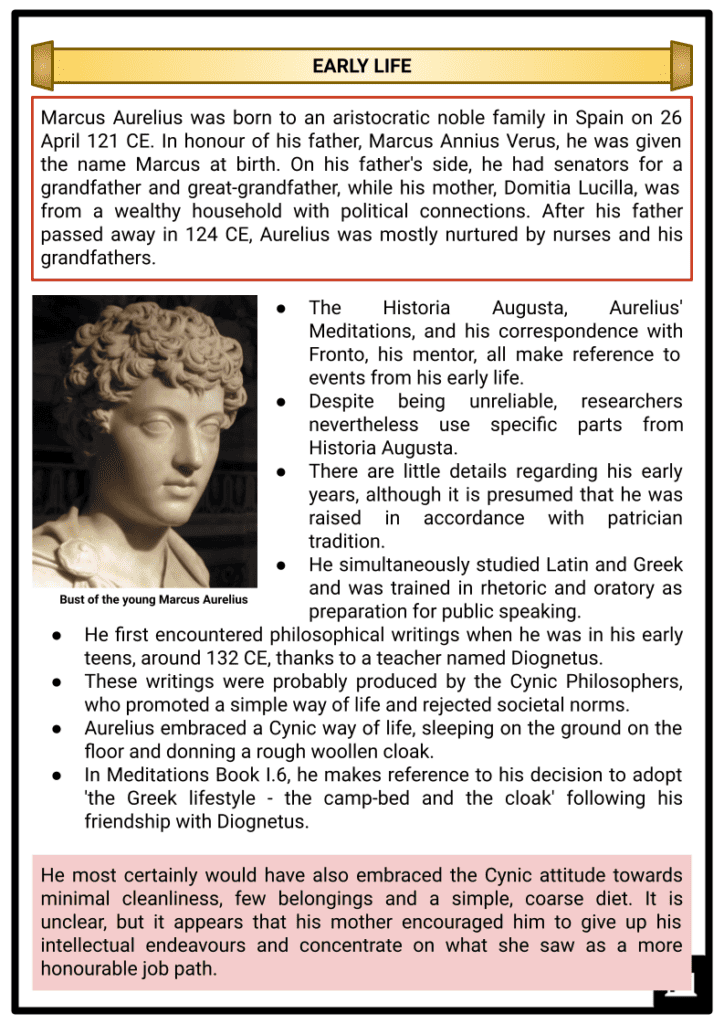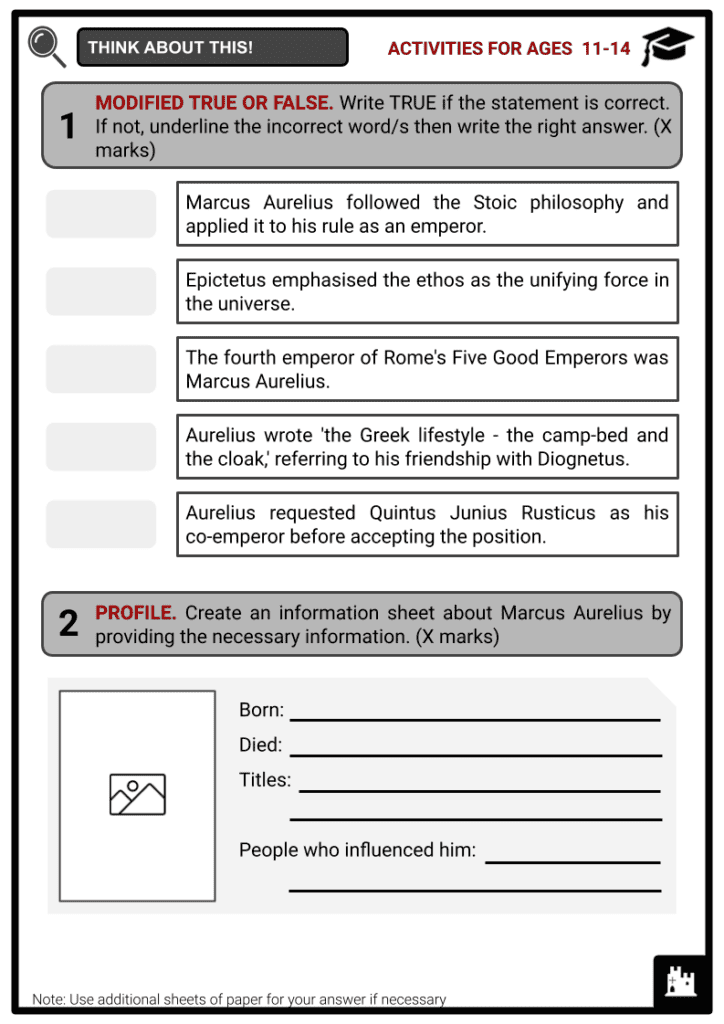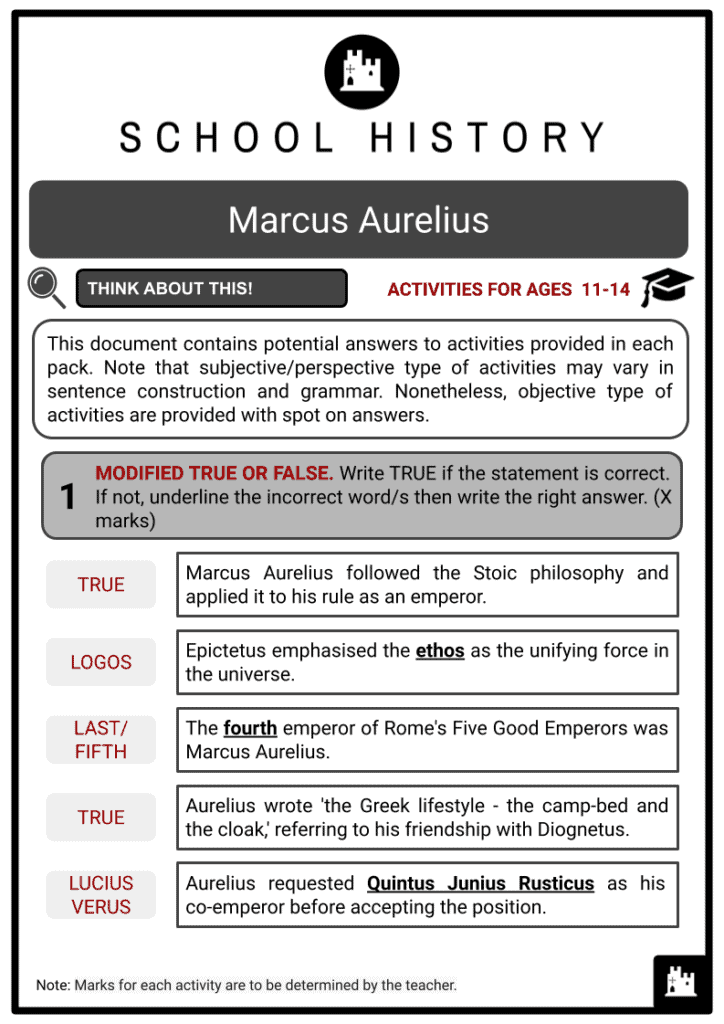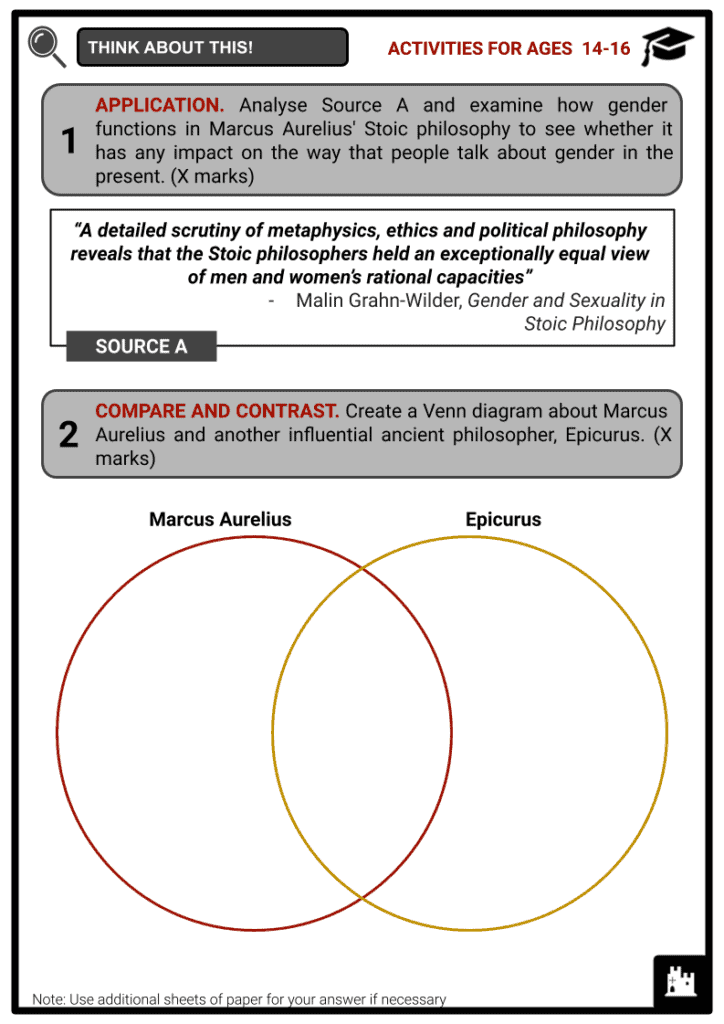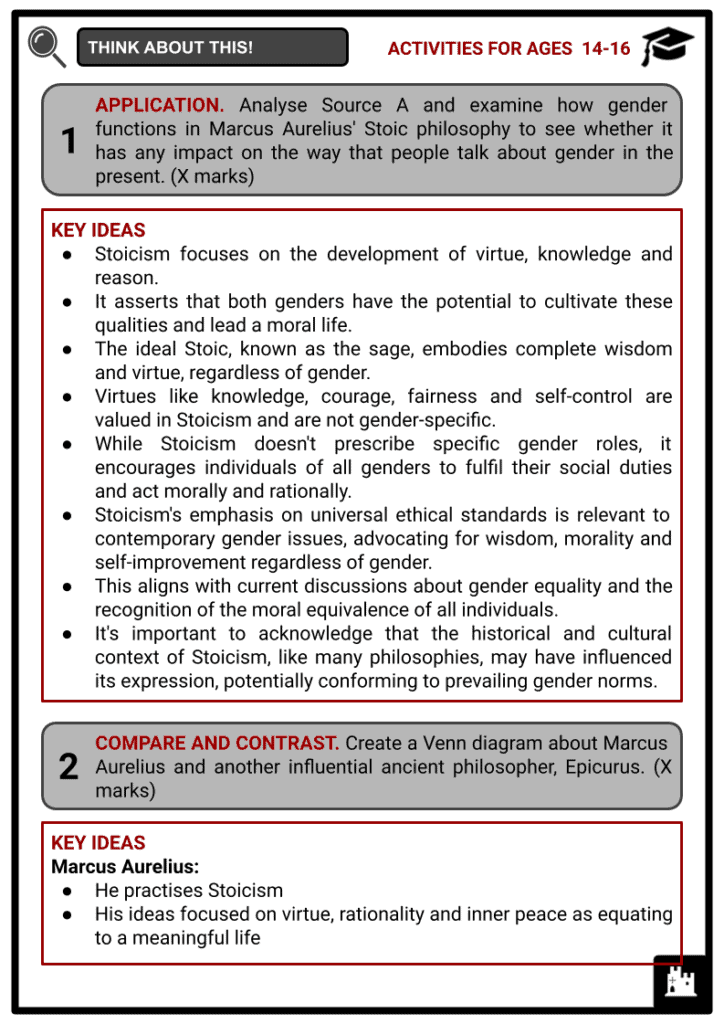Marcus Aurelius Worksheets
Do you want to save dozens of hours in time? Get your evenings and weekends back? Be able to teach about Marcus Aurelius to your students?
Our worksheet bundle includes a fact file and printable worksheets and student activities. Perfect for both the classroom and homeschooling!
Summary
- Early Life
- Rise to Power
- The Emperor
- Death and Legacy
Key Facts And Information
Let’s know more about Marcus Aurelius!
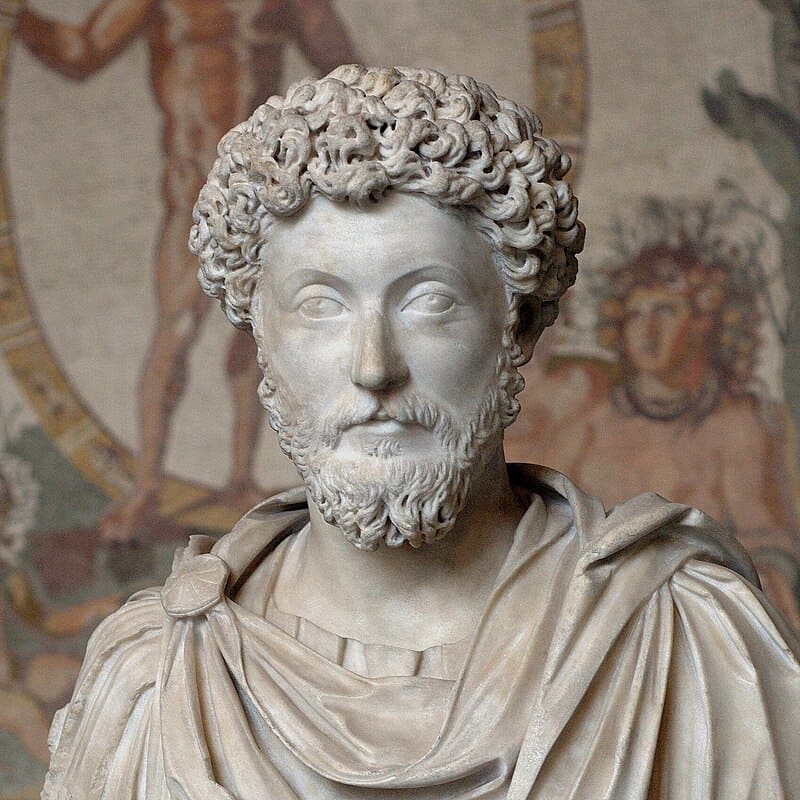
Marcus Aurelius was the last of Rome's Five Good Emperors (after Nerva, Trajan, Hadrian and Antoninus Pius) and the author of the philosophical treatise Meditations. Modern research contests the assertion that he instigated a persecution of Christians. He presided over the Roman Empire during the Pax Romana, which lasted from 27 BC to 180 CE and was a time of comparatively calm, balance and peace. He was also a Roman consul in 140, 145 and 161 CE.
EARLY LIFE
- Marcus Aurelius was born to an aristocratic noble family in Spain on 26 April 121 CE. In honour of his father, Marcus Annius Verus, he was given the name Marcus at birth. On his father's side, he had senators for a grandfather and great-grandfather, while his mother, Domitia Lucilla, was from a wealthy household with political connections. After his father passed away in 124 CE, Aurelius was mostly nurtured by nurses and his grandfathers.
- The Historia Augusta, Aurelius' Meditations, and his correspondence with Fronto, his mentor, all make reference to events from his early life.
- Despite being unreliable, researchers nevertheless use specific parts from Historia Augusta.
- There are little details regarding his early years, although it is presumed that he was raised in accordance with patrician tradition.
- He simultaneously studied Latin and Greek and was trained in rhetoric and oratory as preparation for public speaking.
- He first encountered philosophical writings when he was in his early teens, around 132 CE, thanks to a teacher named Diognetus.
- These writings were probably produced by the Cynic Philosophers, who promoted a simple way of life and rejected societal norms.
- Aurelius embraced a Cynic way of life, sleeping on the ground on the floor and donning a rough woollen cloak.
- In Meditations Book I.6, he makes reference to his decision to adopt 'the Greek lifestyle - the camp-bed and the cloak' following his friendship with Diognetus.
- He most certainly would have also embraced the Cynic attitude towards minimal cleanliness, few belongings and a simple, coarse diet. It is unclear, but it appears that his mother encouraged him to give up his intellectual endeavours and concentrate on what she saw as a more honourable job path.
- He then obtained additional instruction in rhetoric and oratory from individuals like Marcus Cornelius Fronto and Herodes Atticus, whose reputations for artistic brilliance were highly valued and demanded a great price. Fronto and Aurelius would become close friends for the rest of their lives, and both Fronto and Atticus would have a big impact on the impressionable young Aurelius. Soon after, he became engaged to Ceionia Fabia, sister of Aurelius' eventual co-emperor Lucius Verus and the daughter of renowned politician Lucius Ceionius Commodus.
RISE TO POWER
- Lucius Ceionius Commodus was chosen as the emperor Hadrian's successor in 136 CE for unknown reasons. Given that Commodus was related to Marcus Aurelius' aunt Faustina, it seems likely that Hadrian chose Commodus to serve as a sort of stand-in for the young Aurelius, who would eventually succeed him.
- However, after Commodus' death in 138 CE, Hadrian appointed Aurelius Antoninus (later known as Antoninus Pius) as his successor with the condition that he adopt Marcus and Lucius Verus as his sons and successors. Antoninus complied, and the young Marcus adopted the name Marcus Aurelius Antoninus and was prepared to succeed Commodus.
- Marcus Aurelius, Antoninus Pius' successor, took a lot after him as a highly successful ruler.
- Aurelius praises Antoninus and enumerates his excellent traits in Meditations.
- Aurelius' engagement to Ceionia Fabia was dissolved by Antoninus, who had arranged for him to wed his daughter Anna Galeria Faustina (Faustina Minor).
- Aurelius was thoroughly trained for leadership by Antoninus, despite the fact that he didn't emphasise the military.
- Aurelius performed his duties, although his preference was for philosophical reflection rather than attending to courtly duties. He followed Pius' advice to live there, even though he could have chosen a simpler existence elsewhere, both to improve his reputation among the elite and for practical reasons.
- He complains about his teachers at the time, his primarily secretarial responsibilities and court life in general in his letters to Fronto. Such obligations would have seemed very pointless to him given his philosophical outlook. Around this period, he met two new instructors who Antoninus had summoned to the court to instruct Aurelius in philosophy. They were Quintus Junius Rusticus, one of the best Stoic philosophers of his day, and Apollonius of Chalcedon. Aurelius gives both men great regard in his Meditations and enumerates the several valuable lessons he took away from them.
- The Stoics believed that by concentrating on the logos, one could attain inner peace, understanding that events are natural and their interpretation determines their value. Despite Fronto's disagreement with Aurelius' interest in Stoicism, the future emperor fully embraced the philosophy and would later apply these teachings once in power.
THE EMPEROR
- When Antoninus Pius passed away in March of 161 CE, the senate looked to Aurelius to become the new emperor. However, in accordance with Hadrian's original plans, Aurelius declined the honour unless Lucius Verus was elevated as co-emperor alongside him. His request was accepted, and Aurelius and Verus started their rule by establishing charitable initiatives for the underprivileged and honouring the military with higher pay.
- The two emperors immediately gained a cult following among the populace by promoting free speech, the arts, education, and debasing the currency, which also temporarily boosted the economy. While Verus, who had always been more opulent, indulged himself with costly parties and expensive gifts to friends, Aurelius continued to uphold his Stoic beliefs as emperor.
- Late in 161 CE, Vologases IV of the Parthians invaded Armenia, which was protected by Rome, while Syria, a Roman province, rose up in rebellion.
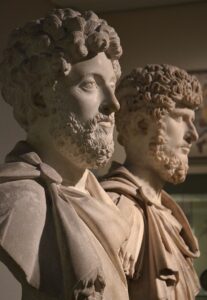
Bust of Aurelius and Verus - Since Verus had more military expertise than Aurelius, he took direct control of the eastern campaigns.
- Additionally, it's believed that Verus may have been coerced into departing by Aurelius in order to stop his expensive parties.
- The Romans won the Parthian Wars, which continued until 166 CE.
- The general Gaius Avidius Cassius, who masterfully organised the forces and developed the strategies, deserves more credit than Verus for this victory.
- Aurelius stayed in Rome while Verus was abroad on an expedition, and by all accounts, he carried out his duties admirably. He decided court cases, evaluated and passed laws that helped all classes in Rome, dealt with the various requests and issues that came in from the provinces, and passed laws that benefited all classes in Rome. He is also accused of persecuting a nascent Christian sect that challenged the established order and refused to respect the national religion at this time.
- It is undeniable that Christians were persecuted under Aurelius' rule, but contemporary researchers are increasingly arguing that he did not order it. Both Antoninus Pius and Aurelius had issued edicts defending the Christians. According to Melito of Sardis' Apology for Christianity, which he addressed to Aurelius in an effort to get him to step in and stop the persecution, the persecution of Christians appears to have been planned by local governors. There is no record of a reaction, so it's conceivable that Aurelius never got the work, and regional persecutions persisted at least until 180 CE.
- Around 166 CE, it seemed the battle with Parthia was nearing victory.
- In 145 CE, Aurelius married Faustina, and they had multiple children over the years.
- Despite some early deaths among their children, Aurelius believed he was favoured by the gods.
- The Marcomanni tribe from Germania, in alliance with the Persian Sarmatians, invaded Roman territories along the Danube after the Parthian war ended.
- In 167 CE, Aurelius and Verus collaborated to repel the invaders and restore order.
- Marcus Nonius Macrinus, a seasoned military commander and consul closely associated with Aurelius, possibly offered advice during the conflict.
- Macrinus' role may have influenced the character Maximus Decimus Meridius in the movie Gladiator.
- When Verus passed away in 169 CE, most likely from the disease his soldiers had brought back to Rome after a campaign, Aurelius became the sole ruler. In Germania, where he would write his Meditations, he would spend the most of his remaining reign conducting expeditions.
DEATH AND LEGACY
- Though far from a philosophical book, Meditations is one man's reflections on life and the fight to maintain inner calm in the face of incessant external threats. The solution provided by Aurelius to the issue is not a solution, but rather a disciplined approach to forgoing the luxury of self-pity.
- According to the Stoic philosophy, everything that occurs in life is normal, including illness, happiness, disappointment, joy and even death. What causes problems is how one interprets these events. One's fate is also under the direction of the logos, which governs all things, yet a human being still has the ability to decide how to react to a given situation.
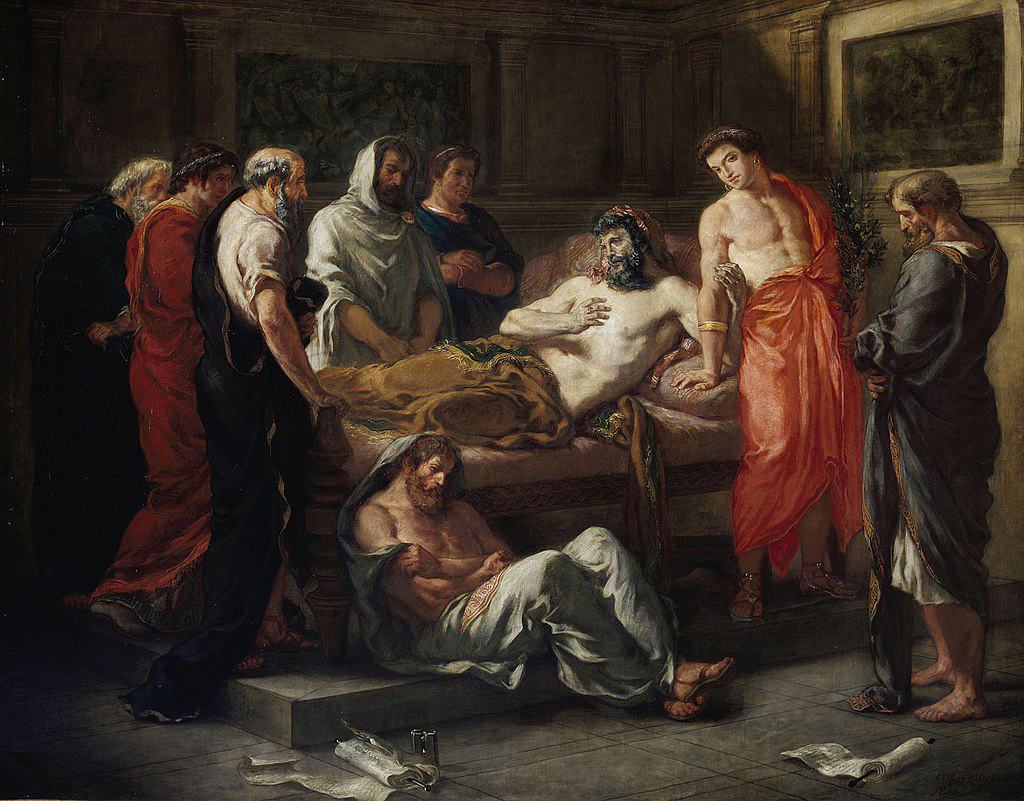
Painting Last Words of the Emperor Marcus Aurelius - After routing the Germanic tribes on the Danube in 178 CE, Aurelius retired to Vindobona for the winter. Commodus succeeded him after he passed away there in March of 180 CE, two years later. He attempted to raise his son in the same methodical manner that Antoninus Pius had done, but he appears to have come to terms with the fact that he had failed.
- It is unknown what happened to the Meditations following Aurelius' passing, although copies were prepared and kept for posterity. The fourth-century CE orator Themistius and the Historia Augusta both make reference to the book. It is not mentioned again until the priest Arethas acknowledges duplicating it in a letter to a friend in the 10th century CE.
- Meditations, which is thought to have been one of the works saved from the library of Constantinople in 1453 CE when the city succumbed to the Ottoman Turks, may have survived thanks to Arethas' copy. The first printed edition of the text was made available in 1559 CE when these books were transported to the West and copied there. Marcus Aurelius likely would have preferred it if it had long since become a source of inspiration for individuals all over the world who knew Aurelius first and foremost as a philosopher and only secondly as an emperor.
Image Sources
- https://en.wikipedia.org/wiki/Marcus_Aurelius#/media/File:Marcus_Aurelius_Glyptothek_M%C3%BCnchen.jpg
- https://en.wikipedia.org/wiki/Marcus_Aurelius#/media/File:Co-emperors_Marcus_Aurelius_and_Lucius_Verus,_British_Museum_(23455313842).jpg
- https://en.wikipedia.org/wiki/Marcus_Aurelius#/media/File:Delacroix-Marc_Aur%C3%A8le-MBA-Lyon.jpg
Frequently Asked Questions
- Who was Marcus Aurelius?
Marcus Aurelius was a Roman Emperor who ruled from 161 to 180 CE. He was the last of the "Five Good Emperors" and is renowned for his philosophical writings, particularly his "Meditations."
- Does Aurelius believe in God?
As a Stoic philosopher, Marcus Aurelius held a complex and nuanced view of the concept of God or the divine. As a philosophical school, Stoicism did not have a single, universally accepted theological position. Instead, it encompassed a range of beliefs regarding the divine.
- What is the significance of "Meditations" by Marcus Aurelius?
"Meditations" is a collection of Marcus Aurelius' personal reflections on life, morality, and the human condition. It provides insight into his Stoic philosophy and is a valuable source of wisdom and guidance for readers seeking a deeper understanding of ethics and virtue.

